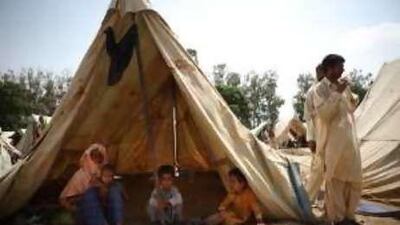MULTAN, PAKISTAN // Seven-year-old Naseem Bibbi lay on a blanket in the shade of a tree at the Ritra refugee camp in Pakistan, too weak to wave away the flies that swirled around her head.
She fell sick with fever and dysentery three days ago and has enough strength only to drink a little water. "We are very worried for her," said her father, Nasir, 35. "We have medicine for her from the camp, but she is already so weak. She is sleeping a lot." The floods hit the family's little village in Changee, around 1.5km away from the camp, two weeks ago and swept away all their possessions. Their mud-brick house was washed away after the nearby Indus and Chenab rivers broke their banks.
Naseem, her parents, her grandmother and eight brothers and sisters were stranded for two days before being picked up by a rescue boat and taken to the camp. Having survived that ordeal, they had thought the worst was behind them. Now a greater threat is looming - the threat of disease. The UN has set a donation target of US$460 million (Dh1.7 billion) to aid about 20 million people who have been affected nationwide by the floods. At least 1,500 have died in what the UN has described as the most catastrophic natural disaster in its history.
Army officials estimate 2.6 million people have been affected in southern Punjab, with 500,000 having lost their homes and about 3,000 stranded. Only 15 people in the region lost their lives as a direct result of the flooding, but now many hundreds of thousands are at risk of falling prey to infection. The UAE has dispatched three Chinook helicopters to the Multan air base, where the relief effort in southern Punjab is being coordinated. A team of 40 Emiratis have been working up to 12 hours a day for almost two weeks, shuttling much-needed aid to relief outposts in some of the most far-flung corners of the region.
The Ritra camp is home to around 1,700 displaced people. There are a further 45 similar camps scattered throughout southern Punjab, one of the worst affected areas of Pakistan. With temperatures soaring to more than 37°C and little sanitation and fresh water, the tent cities are proving a breeding ground for infectious diseases such as cholera and dysentery. Empty water bottles and packaging from emergency rations are strewn around the Ritra camp.
Each family there has a story to tell of their ordeal. Bashir Omar and his wife, Bilkise, both 32, and their two children arrived at Ritra around four weeks ago after their home was destroyed by floodwater. "We left the house in the middle of the night," said Mr Omar. "It was around 2.30am and suddenly we heard a crash. Our house was made out of mud bricks and they just washed away. "The water was so strong. It was very frightening. I was worried for my children.
"We arrived at the camp and soon after the children became sick with a fever. They went to the hospital and now they are better but they are weak. "I just want to go back home but we have to wait until the water goes down." Saif Ullah, 38, and his family knew the floods were coming but stayed at their home hoping they would pass by, taking turns at night shifts in case the waters came. "Some of our neighbours did not have a watch party," he said. "They were swept away by the water. I don't know what happened to them.
"Everything has gone. We have lost all our winter clothes, all our seeds, the bedding and our two goats. "I want to go home soon. Maybe I can find some of our things." His daughter, Zana, has fallen ill with diarrhoea and vomiting. "My wife is very worried for our daughter. It is hard to see your children get sick. My wife is too upset to eat and cries a lot of the time." Mohammed Imran, 15, has been living at the Ritra camp for three weeks. He fled his home with his parents and three brothers after the water destroyed their mud-brick house.
They have lost everything - their home, their belongings, the little money they had saved. Even their four goats, which provided the family with a little income, have been lost. The Pakistani military have devised a three-stage approach to the floods: first, focusing on rescue and support of those made homeless; second, returning people to their homes; third, assisting with reconstruction of roads and infrastructure.
But the deadline for stage two has been pushed back because of continued bad weather, while advanced forecasts predict a further deluge at the end of the month. "It is very upsetting to see my country like this," said Major Muhammad Usman, 28, of the Pakistani army, who is helping coordinate relief at Ritra. "We are not a rich country and the floods have been terrible. They have devastated whole communities. It will be a long reconstruction and we do need the help of other richer countries."
But thoughts of reconstruction are far from the minds of Nasir Bibbi and his sick daughter, Naseem. For now they are concerned with a more immediate issue: simple survival. @Email:chamilton@thenational.ae

